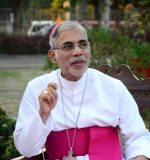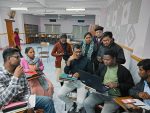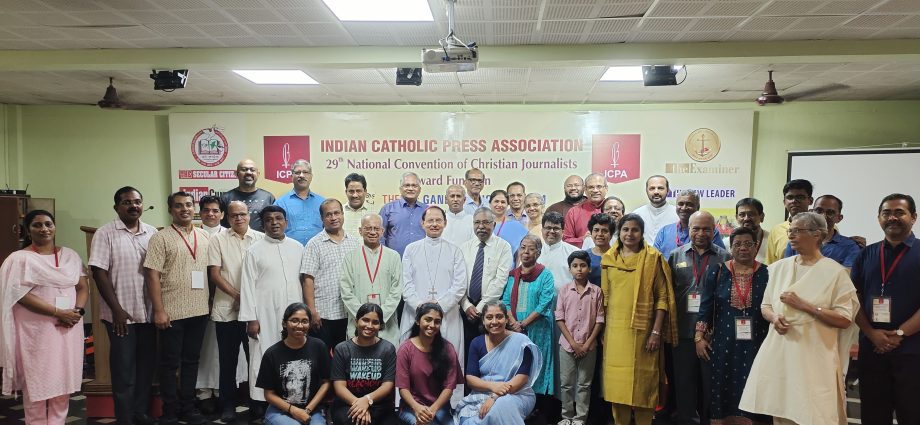By Thomas Scaria
Mangaluru, Oct 3, 2024: The Indian Catholic Press Association (ICPA) has called on Christian journalists to imbibe the Gandhian values of truth, nonviolence and justice in reporting.
“The deliberations made us realize how untruth, injustice and violence have permeated every section of society, and the media play a significant role in this painful reality,” bemoaned the final statement of the association’s 29th annual assembly.
The October 1-2 assembly in the southern Indian port city of Mangaluru observed that the press in India has abdicated its responsibility or are being throttled.
The statement, presented by human rights activist Jesuit Father Cedric Prakash, observed that in the 2024 edition of the World Press Freedom Index India ranked 159 among 180 nations.
“In view of the Article 19 of our Constitution which guarantees every citizen the Freedom of Speech and Expression, we the members of the ICPA pledge to do all we can to internalize, actualize and promote the Gandhian values of journalism,” the statement said.
The convention brought together media professionals, senior journalists, priests, nuns, journalism students and social workers to discuss the vital role of Christian journalists in promoting truth, justice, and non-violence.
Bishop Peter Paul Saldanha of Mangalore, who opened the assembly on October 1, emphasized Christian journalists’ crucial role in upholding truth and non-violence.
“Media is the fourth pillar of democracy in India and it is the conscience keeper of society, where Christian journalists should stand for non-violence and truth, uplifting society,” the prelate asserted.
Bishop Saldanha lamented attempts to suppress the truth but asserted that truth alone will prevail in the end.
Bishop Henry D’Souza of Bellary, ecclesiastical advisor to the association, underlined the role and responsibilities of a Catholic journalist in India, at a time when news and views are presented at the interest of media owners.
“Gandhian journalism, upholding truth, justice and non-violence” was the theme of the event that coincided with the birth anniversary of Mahatma Gandhi, which is now observed as the International Day of Nonviolence.
Retired High Court judge H.N. Nagamohan Das of the Karnataka High Court, who addressed the gathering, stressed the crucial role of journalists in promoting constitutional awareness, citing Gandhi’s publications as an example.
“Journalists should particularly embody the Gandhian principles in their daily lives, emphasizing non-violence as the only path to world peace,” he added.
Justice Das also highlighted some alarming statistics on nearly 50 million cases pending across Indian courts, with the Supreme Court disposing of 70,000 cases annually, and asserted that legal illiteracy is “a staring reality” among educated Indians, who commit most crimes.
He also expressed concern over the distortion of facts and spreading of falsehoods by those in power and the general public.
“Gandhi believed that non-violence is not a sign of weakness but a strength, and it’s the responsibility of journalists to spread this message,” said the judge who asserted that everyone has a right to know the right news.
Experts like Purushothama Bilimale, H S Anupama, writer and activist and Father Prakash presented Gandhian understanding of truth , nonviolence and justice and the challenges faced by journalists in presenting news.
A message from Tushar Gandhi, Mahatma Gandhi’s great-grandson, to the ICPA assembly was read out by Capuchin Father Suresh Mathew, the association’s secretary.
The highlight of the assembly was the ICPA national Awards ceremony which honored Shaison P Ouseph, filmmaker and director of “Face of the Faceless,” Vinayak Nirmal, motivation writer, and Father Antony Pancras, the editor of New Leader.
Karnataka Legislative Assembly speaker U.T. Khader, who handed over the awards. emphasized the crucial role of the press as democracy’s watchdog, stressing its immense responsibility.
The event was hosted by the Mangalore diocese and Raknno (Guardian), the diocesan weekly, led by its editor Father Rupesh Madtha.












There is some good news for journalists. The Supreme Court on Friday 04 October 2024 said criminal cases should not be registered against journalists merely because their writings are perceived as criticism of the government, ruling that such action violates their fundamental right to free speech.
A two-judge bench passed this order while staying coercive action against journalist Abhishek Upadhya, who faces criminal prosecution by the Uttar Pradesh government for writing on caste dynamics in the appointment of bureaucrats in the state.
“In democratic nations, freedom to express one’s views (is) respected. The rights of the journalists are protected under Article 19(1)(a) of the Constitution of India,” the bench of Justice Hrishikesh Roy and Justice S.V.N. Bhatti said.
“Merely because writings of a journalist are perceived as criticism of the government, criminal cases should not be slapped against the writer.” Link: https://epaper.telegraphindia.com/imageview/485346/4493370/71.html
https://epaper.telegraphindia.com/imageview/485360/55353678/71.html